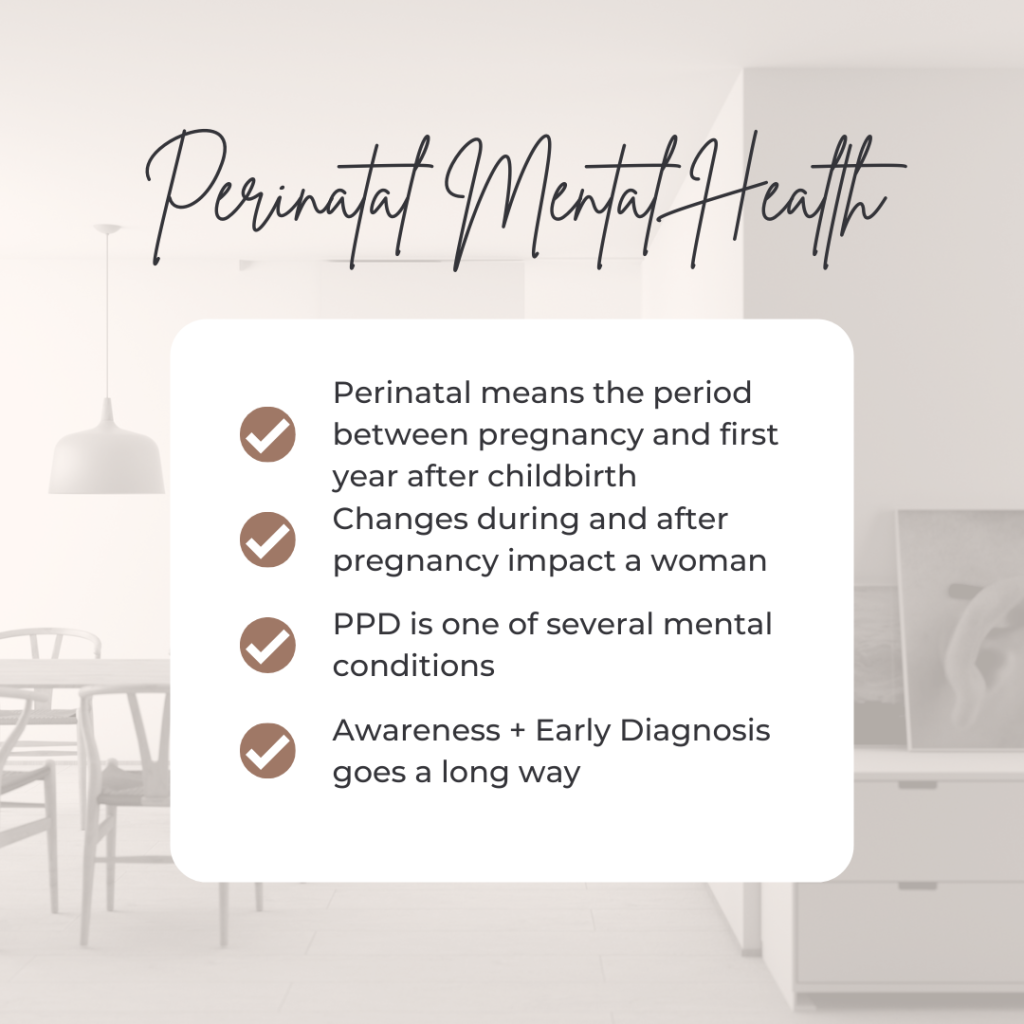Mental health, in general, refers to an individual’s psychological and emotional wellness. It refers to how we feel, think and act. According to a report by WHO, mental health also includes the ability to cope with life’s daily stressors, be productive as well as contribute to the community.
Maternal mental health therefore, refers to a woman’s mental health during the perinatal period. The perinatal period is a term that is generally used to define the period during pregnancy and up to one year after childbirth.
Pregnancy brings with it great excitement for many mothers-to-be. This transition, however, places women at great vulnerability of mental health difficulties. Research suggests that women are at the greatest risk of mental illness during pregnancy and in the postpartum period. This is true even for women who have no history of a mental illness.

Why is maternal mental health important?
Maternal mental health is a basic right for every woman. Sadly, in many low- and middle-income countries such as Kenya, maternal mental health has not been made a priority in the country’s health agenda. This places a huge burden on the quality of the lives affected women lead.
According to a report made by The Partnership for Maternal, Newborn and Child Health, maternal mental illnesses are a leading cause of disability in the maternal health sector. Statistics show that 1 in every 5 women will experience a mental illness during pregnancy or after birth. This has been linked to maternal mortality, making maternal mental health matters crucial to every country’s health agenda.
Challenges in the maternal mental health field
In the past, many people did not understand that pregnant women and new mothers were at risk of a mental illness. Part of the reason for this was/is the low awareness level and stigma present in the community. Many women are afraid to share about how they feel because of the shame associated with maternal mental illness. This is also coupled with the fear that the baby may be taken away from them.
In addition to this, many health workers have often been trained to address physical conditions in a manner that creates a distinction between physical and mental health. This, according to the Perinatal Mental Health Project, leads to the diagnosis and treatment of symptoms that present physically without addressing the psychosocial impact thereof.
What are some of the maternal mental illnesses that women can experience?
Pregnancy and the postpartum period can be a challenging time for many women. It is not uncommon for women to feel emotional and anxious during this period. It is important, however, to be aware of what maternal mental illnesses are, the symptoms associated and treatment options. Below are some of the maternal mental illnesses.
The baby blues
The ‘baby blues’, also known as postpartum blues are very common, affecting up to 80% of new mothers. Baby blues are characterized by sudden mood swings, irritability, loneliness, sadness, and impatience as well as restlessness. The postpartum blues typically last from a few hours after birth to about two weeks. Baby blues typically do not require any treatment. If the symptoms continue for a long period of time and interfere with a woman’s daily activities, they often to other maternal mental illnesses as listed below.
Depression during pregnancy and after birth
Pregnancy Depression and Postpartum Depression (PPD) are mental conditions that are often characterized by symptoms such as extreme sadness, fatigue, hopelessness, disturbed sleep and appetite (whether too little or too much), irritability and feelings of guilt. In severe PPD, women may experience thoughts of self-harm and/or suicide
Anxiety during pregnancy and after birth
A woman with anxiety during pregnancy or in the postpartum period will often have excessive fears about her baby’s health and safety. Some of the symptoms of anxiety include panic attacks, chest pains, numbness, dizziness and a sense of losing control over events around one’s life.
Obsessive Compulsive Disorder (OCD) during pregnancy and after birth
OCD during pregnancy and after birth is characterized by repetitive, disturbing thoughts or mental pictures, and these are referred to as obsessions. In addition to this, women with OCD often feel the need to do specific things over and over again, and these are referred to as compulsions. These ritualistic behaviours may include things such as checking on the baby constantly, cleaning up many times or even the need to place things in order over and over again.
For many moms with Postpartum OCD, there is also hypervigilance in taking care of the child. Obsessions and compulsions are often scary for affected women, even though they are less likely to act on them. This, according to research, is because the thoughts and actions are more anxious than they are delusional.
Postpartum Post-Traumatic Stress Disorder(PTSD)
Postpartum PTSD is often preceded by a traumatic birth experience or trauma in the past. Trauma may include severe complications during pregnancy and/or birth, an unplanned C-section during delivery or baby having to go to NICU due to health complications.
In recent times, research has shown that poor communication or lack of support during labour and delivery has also been linked to trauma. Women who have gone through sexual abuse are also at high risk of postpartum PTSD. Its symptoms include flashbacks, anxiety, nightmares and intense re-experiencing of the trauma (and for affected mothers, this could be the birth process itself).
Postpartum Psychosis
Women who suffer Postpartum Psychosis will often hallucinate (that is, seeing images and hearing voices that others cannot) and experience delusion. Other symptoms include irritability, hyperactivity, paranoia, distrust of those around and a detachment from reality. The latter makes Postpartum Psychosis a very severe condition, and places women at higher risk of suicide and infanticide compared to other maternal mental illnesses. Immediate medical attention is critical for a woman going through psychosis.
The aforementioned maternal mental illnesses are all treatable. There are effective treatment options to help affected mothers recover, and it is important for moms to know that they are not alone.

The impact of maternal mental illness
Maternal mental illnesses not only increase maternal mortality, they also impact children negatively if left untreated. Without treatment, the illness worsens and impacts infant health outcome. This is why it is important for countries to take an integrated approach to maternal mental health. By including assessment methods during routine clinics for pregnant women and new mothers, it is possible to promote maternal mental health. This, coupled with psychosocial support and treatment, allows affected women to get the help they need.
REMEMBER: Tunza Mama carries out a mental health assessment for the new mom with our birth preparation and postpartum packages which you can sign up for here. This, as part of our collective effort to improve maternal health outcomes.
Resources
Abramson, A., & Rouse, D. (2008, 03 01). The Postpartum Brain. Greater Good Magazine. California, USA: UC Berkeley.
Ayers, S., & Ford, E. (2012). PTSD following childbirth. City, University of London Institutional Repository, 155-160.
Perinatal Mental Health PRoject. (2013). MATERNAL MENTAL HEALTH: A handbook for health workers. Capetown: PMHP.
The Partnership for Maternal, Newborn & Child Health. (2014). PMNCH Knowledge Summary #31 Maternal mental health: Why it matters and what countries with limited resources can do. The Partnership for Maternal, Newborn and Child Health.
WHO. (2014, 08). Mental Health: A state of well-being. Retrieved 05 9, 2019, from World Health Organization: https://www.who.int/features/factfiles/mental_health/en/



